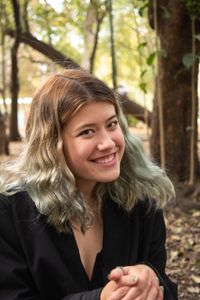Sophie Cutter
CAS Linguistics

- Title CAS Linguistics
How did you get involved in research?
I found the project on the UROP opportunities site and emailed the project directors. They chose me because of my proficiency in Arabic and my experience with immigrants and refugees.
How did you meet your mentor?
I met Margaret through the MENA program at BU. She had contact with the Boston Little Syria Project directors and put me in touch.
What has your UROP experience taught you?
There was no collective research on Boston’s obsolete Little Syria neighborhood. Most of the public doesn’t know that it even existed, including me. It was Boston’s first Arabic-speaking neighborhood and the first Arab immigrants contributed so much culturally and economically to the city. Traces of the neighborhood are still hidden in Boston’s South End; unfortunately the area has been gentrified and displaced mostly because of Boston’s Central Artery Project, rerouting the I-93 into downtown Boston in an attempt to alleviate traffic congestion.
How has this experience helped you with non-research related things at BU?
My research has helped me with my Arabic skills, as I’ve translated 20th century advertisements in Arabic and have read private Arabic collections held in community centers. I’ve also learned how to navigate library resources and public archives for other projects at BU. My main takeaway, however, is understanding Boston’s immigrant history and learning to empathize and take initiative to help these populations today based of patterns in the past. Understanding how urban development plans affect underprivileged populations is important for any global citizen.
What does a day in your research life look like?
Most of my research includes researching public archives, researching notable people and places, investigating cases of citizenship attainment of the first Arabs in Boston, helping with the creation of our interactive digital map, curating exhibitions, and listening to oral histories of residents. I’ve also had the privilege of being the first person to see the Reverend Fairneny special collection in the BPL, which consisted of about thirty plays and stories written in Arabic. Some of them were performed in Syrian churches in Boston to fundraise for aid to send back to Syria-Lebanon.
What advice would you give to someone interested in UROP? Describe your UROP experience in 1-3 sentences.
I would say to branch out and be open to new opportunities. I had never been interested in public history but decided to reach out because of my interest in Arabic and refugee populations. My experience has been enriching and has allowed me to meet researches and curators from the Arab American National Museum, the Boston Public Library, the Chinese Historical Society, MIT, and more—but most of all, I’ve had fun. Don’t be afraid to reach out to your professors if you are interested in initiating a project, as faculty is always willing to help. No project is unimportant.
My experience has been enriching and has allowed me to meet researches and curators from the Arab American National Museum, the Boston Public Library, the Chinese Historical Society, MIT, and more—but most of all, I’ve had fun. This research project has allowed me to have access to amenities that I didn’t know existed. I’ve been privileged enough to have first access to special collections at the BPL, present research at Johns Hopkins University, and handle artifacts owned by the first Arab immigrants in Boston. The best part about my project is interacting with the community around me instead of staying in the BU bubble.
- Roles
- Student
- Profiles
- Sophie Cutter